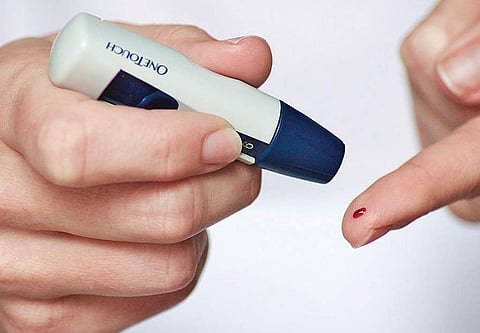The diet and diabetes connect
CHENNAI: Nutrition and physical activity are important parts of a healthy lifestyle for diabetes patients. Eating a balanced and nutritious diet and being physically active can directly help maintain blood glucose levels, which is the mainstay of diabetes management. If you have diabetes, you need to keep an eye on what you eat, how much you eat and when you eat, and how active a lifestyle you lead.
Type 2 diabetes usually begins with insulin resistance, which is a condition in which the body produces insulin but is unable to use it effectively. When this happens, glucose builds up in the blood stream, instead of being absorbed by the cells to be used or stored as energy.
As a result, the body demands more insulin to enable glucose to enter the cells. The pancreas increase the production of insulin to meet the demand. Over a period of time, they can no longer keep up, leading to a rise in blood glucose levels.
Of the risk factors for diabetes, some are modifiable while others are not. Age, race, ethnicity and genetics come under non-modifiable risk factors. Diet, nutrition, exercise and physical activity are modifiable risks that the patient can use to manage or even reverse diabetes.
The location of body fat also makes a difference. Extra belly fat is linked to insulin resistance, diabetes and cardio-vascular diseases. So merely losing weight helps with insulin resistance and diabetes.
There are several goals to managing diabetes, such as maintaining a healthy weight, managing health metrics such as HBA1 c, FBS, PPBS, blood pressure and lipid profile, preventing complications that may occur due to fluctuation of blood glucose, and better compliance with the treatment protocol.
How to achieve these goals? Understanding the macro-nutrients and micro-nutrients in your diet can be the key in managing diabetes. Carbohydrates, proteins and fats are called macro-nutrients because they are requiredin larger quantities in our daily diet.
Carbohydrate intake has a direct effect on post-meal glucose of people with diabetes and is the main macro-nutrient to worry about in glycaemic management. Some studies have suggested that consumption of healthy fats like virgin olive oil and fish oil is associated with improved glucose metabolism and decreased risk for type 2 diabetes. Micronutrients such as sodium, potassium, magnesium, zinc, iodine and iron are all associated with the prevention of type 2 diabetes.
In light of this, patients need to do dietary modifications to better manage or prevent diabetes. They should eat foods from all the food groups (carbohydrates, protein and fat), as omitting a food group may result in skipping a nutrient in the daily diet.
A holistic approach to changing one’s lifestyle, that involvesnutrition, exercise, and emoti onal and spiritual needs, is a sustainable way to control and reverse diabetes over time.

